- Home
- Josephine Tey
Daughter of Time Page 4
Daughter of Time Read online
Page 4
"We had the Scots tied to our tails for good."
"Better than having them at our throats every five minutes. Tyrrel is said to be the man who put the boys out of the way."
"The nephews? No, it doesn't ring a bell. Well, I must be getting along. Anything I can do for you?"
"Did you say you were going to Charing Cross Road?"
"To the Phoenix, yes."
"You could do something for me."
"What is that?"
“Go into one of the bookshops and buy me a History of England. An adult one. And a Life of Richard III, if you can find one."
"Sure, I'll do that."
As he was going out he encountered The Amazon, and looked startled to find anything as large as himself in nurse's uniform. He murmured a good-morning in an abashed way, cast a questioning glance at Grant, and faded into the corridor.
The Amazon said that she was supposed to be giving Number Four her blanket bath but that she had to look in to see if he was convinced.
"Convinced?"
About the nobility of Richard Coeur-de-Lion.
"I haven't got round to Richard the First yet. But keep Number Four waiting a few moments longer and tell me what you know about Richard III."
" Ah, those poor lambs !” she said, her great cow ' s eyes soft with pity.
"Who?"
"Those two precious little boys. It used to be my nightmare when I was a kiddie. That someone would come and put a pillow over my face when I was asleep. "
"Is that how it was done: the murder?"
"Oh, yes. Didn't you know? Sir James Tyrrel rode back to London when the court was at Warwick, and told Dighton and Forrest to kill them, and then they buried them at the foot of some stairs under a great mound of stones."
"But it doesn't say that in the book you lent me."
"Oh, that book is just history-for-exams, if you know what I mean. You don't get really interesting history in swot books like that."
"And where did you get the juicy gossip about Tyrrel, may one ask?"
"It isn't gossip," she said, hurt. "You'll find it in Sir Thomas More's history of his time. And you can't find a more respected or trustworthy person in the whole of history than Sir Thomas More, now can you?"
"No. It would be bad manners to contradict Sir Thomas."
"Well, that's what Sir Thomas says, and, after all, he was alive then and knew all those people to talk to."
"Dighton and Forrest?"
"No, of course not. But Richard, and the poor Queen, and those."
"The Queen? Richard's Queen?"
"Yes."
"Why 'poor'?"
"He led her an awful life. They say he poisoned her. He wanted to marry his niece."
"Why?"
"Because she was the heir to the throne."
"I see. He got rid of the two boys, and then wanted to marry their eldest sister."
"Yes. He couldn't marry either of the boys, you see. "
‘ 'No, I suppose even Richard the Third never thought of that one."
"So he wanted to marry Elizabeth so as to feel safer on the throne. Actually, of course, she married his successor. She was Queen Elizabeth's grandmother. It always used to please me that Elizabeth was a little bit Plantagenet. I never was very fond of the Tudor side. Now I must go, or Matron will be here on her round before I have Number Four tidied up."
"That would be the end of the world."
"It would be the end of me,” she said, and went away.
Grant took the book she had left him off the pile again, and tried to make head or tail of the Wars of the Roses. He failed. Armies marched and counter-marched. York and Lancaster succeeded each other as victors in a bewildering repetition. It was as meaningless as watching a crowd of dodgem cars bumping and whirling at a fair.
But it seemed to him that the whole trouble was implicit, the germ of it sown, nearly a hundred years earlier, when the direct line was broken by the deposition of Richard II. He knew all about that because he had in his youth seen Richard of Bordeaux at the New Theatre; four times he had seen it. For three generations the usurping Lancasters had ruled England: Richard of Bordeaux's Henry unhappily but with fair efficiency, Shakespeare's Prince Hal with Agincourt for glory and the stake for zeal, and his son in half-witted muddle and failure. It was no wonder if men hankered after the legitimate line again, as they watched poor Henry VI's inept friends frittering away the victories in France while Henry nursed his new foundation of Eton and besought the ladies at court to cover up their bosoms.
All three Lancasters had had an unlovely fanaticism which contrasted sharply with the liberalism of the Court which had died with Richard II. Richard's live-and-let-live methods had given place, almost overnight, to the burning of heretics. For three generations heretics had burned. It was no wonder if a less public fire of discontent had begun to smoulder in the heart of the man on the street.
Especially since there, before their eyes, was the Duke of York. Able, sensible, influential, gifted, a great prince in his own right, and by blood the heir of Richard II. They might not desire that York should take the place of poor silly Henry, but they did wish that he would take over the running of the country and clean up the mess.
York tried it, and died in battle for his pains, and his family spent much time in exile or sanctuary as a result.
But when the tumult and the shouting was all over, there on the throne of England was the son who had fought alongside him in that struggle, and the country settled back happily under that tall, flaxen, wenching, exceedingly beautiful but most remarkably shrewd young man, Edward IV.
And that was as near as Grant would ever come to understanding the Wars of the Roses.
He looked up from his book to find Matron standing in the middle of the room.
"I did knock," she said, "but you were lost in your book."
She stood there, slender and remote; as elegant in her way as Marta was; her white-cuffed hands clasped loosely in front of her narrow waist; her white veil spreading itself in imperishable dignity; her only ornament the small silver badge of her diploma. Grant wondered if there was anywhere in this world a more unshakable poise than that achieved by the matron of a great hospital.
"I've taken to history," he said. "Rather late in the day."
"An admirable choice," she said. "It puts things in perspective." Her eyes lighted on the portrait and she said: "Are you York or Lancaster?"
"So you recognize the portrait."
"Oh, yes. When I was a probationer I used to spend a lot of time in the National. I had very little money and very sore feet, and it was warm in the Gallery and quiet and it had plenty of seats. " She smiled a very little, looking back from her present consequence to that young, tired, earnest creature she had been. "I liked the Portrait Gallery best because it gave one the same sense of proportion that reading history does. All those Importances who had made such a to-do over so much in their day. All just names. Just canvas and paint. I saw a lot of that portrait in those days." Her attention went back to the picture. "A most unhappy creature," she said.
"My surgeon thinks it is poliomyelitis."
"Polio?" She considered it. "Perhaps. I hadn't thought of it before. But to me it has always seemed to be intense unhappiness. It is the most desperately unhappy face that I have ever encountered—and I have encountered a great many."
"You think it was painted later than the murder, then?"
"Oh, yes. Obviously. He is not a type that would do anything lightly. A man of that calibre. He must have been well aware of how—heinous the crime was."
"You think he belonged to the type who can't live with themselves any more."
"What a good description! Yes. The kind who want something badly, and then discover that the price they have paid for it is too high."
"So you don't think he was an out-and-out villain?"
"No; oh, no. Villains don't suffer, and that face is full of the most dreadful pain."
They considered the por
trait in silence for a moment or two.
"It must have seemed like retribution, you know. Losing his only boy so soon after. And his wife's death. Being stripped of his own personal world in so short a time. It must have seemed like Divine justice."
"Would he care about his wife?"
"She was his cousin, and they had known each other from childhood. So whether he loved her or not, she must have been a companion for him. When you sit on a throne I suspect that companionship is a rare blessing. Now I must go and see how my hospital is getting on. I have not even asked the question that I came to ask. Which was how you felt this morning. But it is a very healthy sign that you have interest to spare for a man dead these four hundred years. "
She had not moved from the position in which he had first caught sight of her. Now she smiled her faint, withdrawn smile, and with her hands still clasped lightly in front of her belt-buckle moved towards the door. She had a transcendental repose. Like a nun. Like a queen.
CHAPTER FOUR
It was after luncheon before Sergeant Williams reappeared, breathless, bearing two fat volumes.
"You should have left them with the porter," Grant said. "I didn't mean you to come sweating up here with them."
"I had to come up and explain. I had only time to go to one shop, but it's the biggest in the street. That's the best history of England they have in stock. It's the best there is anywhere, they say." He laid down a severe-looking sage-green tome, with an air of taking no responsibility for it. "They had no separate history of Richard III. I mean, no life of him. But they gave me this." This was a gay affair with a coat of arms on the wrapper. It was called The Rose of Raby.
"What is this?"
"She was his mother, it seems. The Rose in question, I mean. I can't wait: I'm due at the Yard in five minutes from now and the Super will flay me alive if I'm late. Sorry I couldn't do better. I'll look in again, first time I'm passing, and if these are no good I'll see what else I can get."
Grant was grateful and said so.
To the sound of Williams' brisk departing footsteps he began his inspection of the "best history of England there is." It turned out to be what is known as a "constitutional" history; a sober compilation lightened with improving illustrations. An illumination from the Luttrell Psalter decorated the husbandry of the fourteenth century, and a contemporary map of London bisected the Great Fire. Kings and queens were mentioned only incidentally. Tanner's Constitutional History was concerned only with social progress and political evolution; with the Black Death, and the invention of printing, and the use of gunpowder, and the formation of the Trade Guilds, and so forth. But here and there Mr. Tanner was forced, by a horrid germaneness, to mention a king or his relations. And one such germaneness occurred in connection with the invention of printing.
A man called Caston came out of the Weald of Kent as draper's apprentice to a future Lord Mayor of London, and then went to Bruges with the twenty marks his master left him in his will. And when, in the dreary autumn rain of the Low Countries, two young refugees from England fetched up on those low shores, in very low water, it was the successful merchant from the Weald of Kent who gave them succour. The refugees were Edward IV and his brother Richard; and when in the turn of the wheel Edward came back to rule England, Caxton came too, and the first books printed in England were printed for Edward IV and written by Edward's brother-in-law.
He turned the pages and marvelled how dull information is deprived of personality. The sorrows of humanity are no one's sorrows, as newspaper readers long ago found out. A frisson of horror may go down one's spine at wholesale destruction but one's heart stays unmoved. A thousand people drowned in floods in China are news: a solitary child drowned in a pond is tragedy. So Mr. Tanner's account of the progress of the English race was admirable but unexciting. But here and there where he could not avoid the personal his narrative flowered into a more immediate interest. In extracts from the Pastons' letters, for instance. The Pastons had a habit of sandwiching scraps of history between orders for salad oil and inquiries as to how Clement was doing at Cambridge. And between two of those domesticities appeared the small item that the two little York boys, George and Richard, were living in the Pastons' London lodgings, and that their brother Edward came every day to see them.
Surely, thought Grant, dropping the book for a moment on the counterpane and staring up at the now invisible ceiling, surely never before can anyone have come to the throne of England with so personal an experience of the ordinary man's life as Edward IV and his brother Richard. And perhaps only Charles II after them. And Charles, even in poverty and flight, had always been a King's son, a man apart. The two little boys who were living in the Pastons' lodgings were merely the babies of the York family. Of no particular importance at the best of times and at the moment when the Pastons' letter was written without a home and possibly without a future.
Grant reached for The Amazon's history book to find out what Edward was about in London at that date, and learned that he was collecting an army. "London was always Yorkist in temper, and men flocked with enthusiasm to the banner of the youthful Edward," said the history book.
And yet young Edward, aged eighteen, idol of a capital city and on the way to the first of his victories, found time to come every day to see his small brothers.
Was it now, Grant wondered, that the remarkable devotion of Richard to his elder brother was born. An unwavering life-long devotion that the history books not only did not deny but actually used in order to point the moral. "Up to the moment of his brother's death Richard had been in all vicissitudes his loyal and faithful helpmeet, but the opportunity of a crown proved too much for him. " Or in the simpler words of the Historical Reader: "He had been a good brother to Edward but when he saw that he might become King greed hardened his heart."
Grant took a sideways look at the portrait and decided that the Historical Reader was off the beam. Whatever had hardened Richard's heart to the point of murder had not been greed. Or did the Historical Reader mean greed for power? Probably. Probably.
But surely Richard must have had all the power that mortal man could wish. He was the King's brother, and rich. Was that short step further so important that he could murder his brother's children to achieve it?
It was an odd set-up altogether.
He was still mulling it over in his mind when Mrs. Tinker came in with fresh pyjamas for him and her daily précis of the newspaper headlines. Mrs. Tinker never read past the third headline of a report unless it happened to be a murder, in which case she read every word and bought an evening paper for herself on the way home to cook Tinker's supper.
Today the gentle burble of her comment on a Yorkshire arsenic-and-exhumation case flowed over him unbroken until she caught sight of the morning paper lying in its virgin condition alongside the books on the table. This brought her to a sudden halt.
"You not feelin' so good today?" she asked in a concerned way.
"I'm fine, Tink, fine. Why?"
"You 'aven't as much as opened your paper. That's 'ow my sister's gel started her decline. Not takin' no notice of what was in the paper."
"Don't worry. I'm on the up-grade. Even my temper has improved. I forgot about the paper because I've been reading history stories. Ever heard of the Princes in the Tower?"
"Everyone's 'eard of the Princes in the Tower."
"And do you know how they met their end?"
"Course I do. He put a pillow on their faces when they was asleep."
"Who did?"
"Their wicked uncle. Richard the Third. You didn't ought to think of things like that when you're poorly. You ought to be reading something nice and cheerful."
"Are you in a hurry to get home, Tink, or could you go round by St. Martin's Lane for me?"
"No, I've plenty of time. Is it Miss Hallard? She won't be at the theatre till six-about."
"No, I know. But you might leave a note for her and she'll get it when she comes in."
He reached for h
is scribbling pad and pencil and wrote:
"For the love of Mike find me a copy of Thomas More's History of Richard III."
He tore off the page, folded it and scribbled Marta's name on it.
"You can give it to old Saxton at the stage-door. He'll see that she gets it."
"If I can get near the stage-door what with the stools for the queue," Mrs. Tinker said; in comment rather than in truth. "That thing's going to run for ever."
She put the folded paper carefully away in the cheap pseudo-leather handbag with the shabby edges that was as much a part of her as her hat. Grant had, Christmas by Christmas, provided her with a new bag; each of them a work of art in the best tradition of English Ieatherworking, an article so admirable in design and so perfect in execution that Marta Hallard might have carried it to luncheon at the Blague. But that was the last he had ever seen of any of them. Since Mrs. Tinker regarded a pawnshop as one degree more disgraceful than prison, he absolved her from any suspicion of cashing in on her presents. He deduced that the handbags were safely laid away in a drawer somewhere, still wrapped up in the original tissue paper. Perhaps she took them out to show people sometimes, sometimes perhaps just to gloat over; or perhaps the knowledge that they were there enriched her, as the knowledge of "something put by for my funeral" might enrich another. Next Christmas he was going to open this shabby sack of hers, this perennial satchel à toute faire, and put something in the money compartment. She would fritter it away, of course, in small unimportances; so that in the end she would not know what she had done with it; but perhaps a series of small satisfactions scattered like sequins over the texture of everyday life was of greater worth than the academic satisfaction of owning a collection of fine objects at the back of a drawer.
When she had gone creaking away, in a shoes-and-corset concerto, he went back to Mr. Tanner and tried to improve his mind by acquiring some of Mr. Tanner's interest in the human race. But he found it an effort. Neither by nature nor by profession was he interested in mankind in the large. His bias, native and acquired, was towards the personal. He waded through Mr. Tanner's statistics and longed for a king in an oak tree, or a broom tied to a mast-head, or a Highlander hanging on to a trooper's stirrup in a charge. But at least he had the satisfaction of learning that the Englishman of the fifteenth century "drank water only as a penance." The English labourer of Richard Ill's day was, it seemed, the admiration of the continent. Mr. Tanner quoted a contemporary, writing in France.

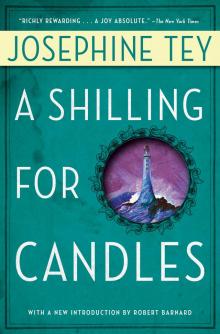 A Shilling for Candles
A Shilling for Candles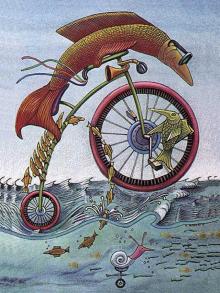 The Singing Sands
The Singing Sands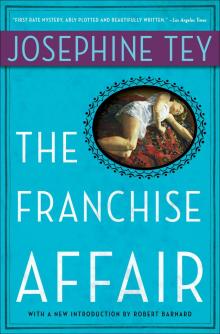 The Franchise Affair
The Franchise Affair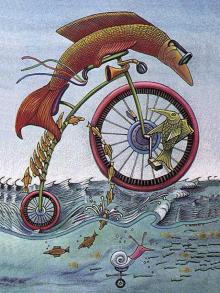 Daughter of Time
Daughter of Time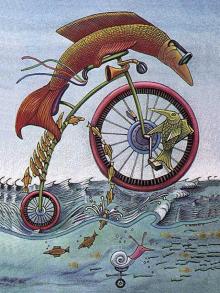 To Love and Be Wise
To Love and Be Wise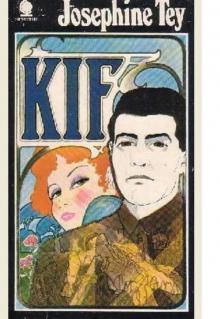 Kif
Kif The Expensive Halo: A Fable Without Moral
The Expensive Halo: A Fable Without Moral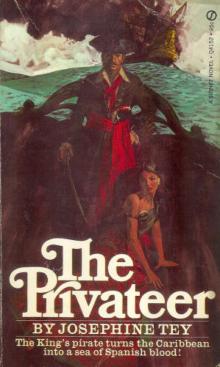 The Privateer
The Privateer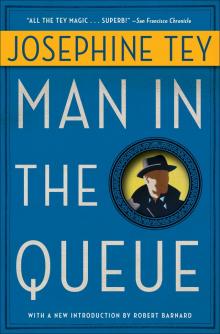 The Man in the Queue
The Man in the Queue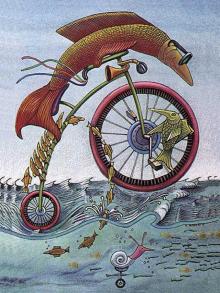 Miss Pym Disposes
Miss Pym Disposes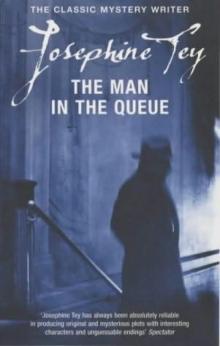 The Man in the Queue ag-1
The Man in the Queue ag-1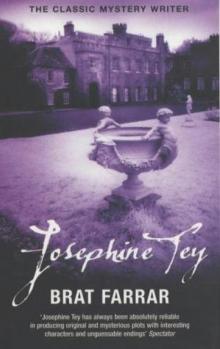 Brat Farrar
Brat Farrar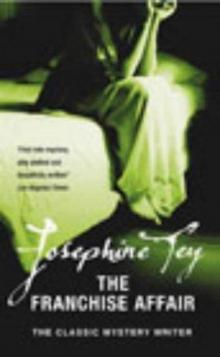 The Franchise Affair ag-3
The Franchise Affair ag-3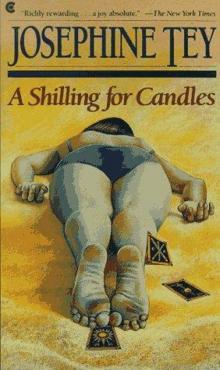 A Shilling for Candles ag-2
A Shilling for Candles ag-2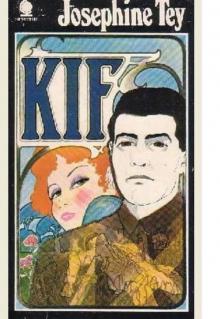 Kif: An Unvarnished History
Kif: An Unvarnished History The Expensive Halo
The Expensive Halo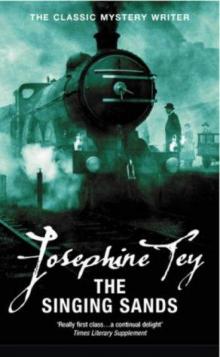 The Singing Sands ag-6
The Singing Sands ag-6 To Love and Be Wise ag-4
To Love and Be Wise ag-4